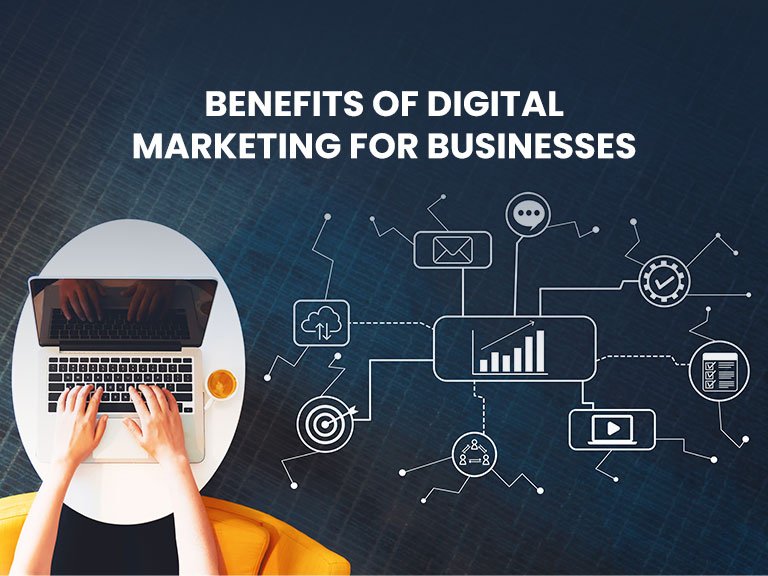Digital marketing has revolutionized the way businesses connect with their audiences. By leveraging online channels, businesses can effectively reach, engage, and convert potential customers in ways that were not possible with traditional marketing methods. Here are the key advantages of digital marketing:
1. Global Reach
Digital marketing enables businesses to reach a global audience. Unlike traditional marketing, which is often constrained by geography, digital marketing allows you to connect with customers from anywhere in the world. This expanded reach opens up new markets and growth opportunities, making it easier for even small businesses to compete on a global scale.
2. Cost-Effectiveness
One of the most significant advantages of digital marketing is its cost-effectiveness. Online advertising platforms like Google Ads, social media ads, and email marketing allow businesses to reach a large audience at a fraction of the cost of traditional advertising methods like TV, radio, or print ads. This makes digital marketing accessible to businesses of all sizes, including startups with limited budgets.
3. Targeted Advertising
Digital marketing offers unparalleled precision in targeting specific audiences. With tools like Google Ads, Facebook Ads, and LinkedIn Ads, you can target potential customers based on demographics, interests, behaviors, location, and more. This targeted approach ensures that your marketing efforts reach the right people, increasing the likelihood of conversion and maximizing ROI.
4. Measurable Results
Digital marketing provides measurable results through analytics and tracking tools. Platforms like Google Analytics, social media insights, and email marketing software offer detailed data on campaign performance, including metrics like click-through rates, conversion rates, and return on investment (ROI). This data-driven approach allows businesses to assess the effectiveness of their campaigns and make informed decisions.
5. Personalization
Digital marketing allows for high levels of personalization, which can enhance customer experience and increase engagement. By using data collected from user interactions, businesses can create personalized content, offers, and recommendations tailored to individual preferences. This level of personalization helps build stronger relationships with customers and fosters loyalty.
6. Increased Engagement
Digital marketing facilitates direct interaction with your audience through various channels, such as social media, email, and content marketing. This engagement not only helps build relationships with customers but also provides valuable insights into their needs and preferences. Active engagement through comments, likes, shares, and direct messages also boosts your brand’s visibility and credibility.
7. Flexibility and Adaptability
Digital marketing campaigns can be easily modified and optimized in real-time based on performance data. Whether you need to adjust your ad budget, change your target audience, or tweak your messaging, digital marketing offers the flexibility to make these changes quickly. This adaptability ensures that your campaigns remain effective and aligned with your business goals.
8. Improved Conversion Rates
Digital marketing tactics such as email marketing, social media marketing, and remarketing are highly effective in nurturing leads and converting them into customers. With the ability to target specific audiences and personalize content, businesses can guide prospects through the buyer’s journey more effectively, resulting in higher conversion rates.
9. Enhanced Brand Awareness
Digital marketing increases brand visibility through various online channels, including search engines, social media, and content platforms. By consistently creating and sharing valuable content, businesses can establish themselves as thought leaders in their industry, build brand authority, and reach a larger audience.
10. Better Customer Insights
Digital marketing provides businesses with valuable insights into customer behavior and preferences. By analyzing data from website visits, social media interactions, and online purchases, businesses can gain a deeper understanding of their customers. These insights can be used to improve products, services, and overall customer experience.
11. Competitive Advantage
Businesses that invest in digital marketing can gain a significant competitive advantage. By staying ahead of digital trends and optimizing marketing strategies, companies can outperform competitors who rely solely on traditional marketing methods. A strong online presence also allows businesses to engage with customers more effectively and respond to market changes quickly.
Conclusion
Digital marketing offers numerous advantages that can help businesses of all sizes grow and succeed in today’s digital-first world. From cost-effectiveness and targeted advertising to improved engagement and measurable results, digital marketing provides the tools and strategies necessary to reach and convert more customers. By embracing digital marketing, businesses can stay competitive, build strong relationships with their audience, and drive long-term growth.

